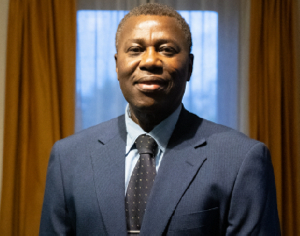Two institutions have called for the arrest of parents and guardians who let loose their children to loiter or engage in hawking in the wake of COVID-19 pandemic.
The institutions, the Commission on Human Rights and Administrative Justice (CHRAJ) and the National Commission for Civic Education (NCCE) described the phenomenon as disheartening, illegal and ultra-violet to the President’s directive for all schools to be closed for maximum protection of children against any possible outbreak of the pandemic.
According to them, there was a need for parents to be responsible for ensuring that their children stay at home and not loiter in town under any circumstances.
In separate interviews with the Ghana News Agency, Mr Tetteh Tuwor, Regional Director of CHRAJ said the children were asked to stay at home to be guided and supervised by parents to study but not to engage in trading.
He indicated that the practice contravened Article 32 of the Convention on the Rights of the Child (CRC) 1989, ratified by 191 countries which states that every child (under 18) has the right to be protected from work that threatens his or her health, education or development.
Mr Tuwor noted that child protection, guaranteed the rights of all children to a life free from danger, violence, abuse, exploitation, neglect among others.
Some children like street children, children with disabilities, children of commercial sex workers, child labourers among others were more vulnerable than others and needed special attention, he added.
Also, the government of Ghana has passed several laws and signed a number of international treaties to guard against exploitative forms of child labour including Article 28 of the 1992 Constitution prohibits labour that is considered injurious to the health, education, or development of the child.
Outlining the dire consequences of child hawking, the Regional Director of CHRAJ said the practice had huge implications for children's physical and emotional well-being, exposing them to sexual abuse, physical exhaustion, accidents, death, malnourishment and drug and substance abuse and prostitution.
Despite the emotional trauma and physical dangers some parents still expose their wards to it saying poverty alleviation, health education and protective child rights policies would decrease the prevalence of child street hawking.
He, therefore advised parents to give proper training and welfare services to their children at home instead of shifting that role to teachers, serve as role models for their children and show them love and care to enable them to grow responsibly.
Mr Tuwor advised the public to wash hands frequently using soap and water or an alcohol-based hand rub, cover mouth and nose with a flexed elbow or tissue, when coughing or sneezing, and throw away the tissue into a closed bin.
Avoid close contact with anyone who has cold or flu-like symptoms and visit the nearest hospital if you have a fever, cough or have difficulty in breathing.
For his part, Mr Paul Tetteh, the Assin Fosu Municipal Director of NCCE blamed the situation on parental irresponsibility saying it was a major contributing factor to the recent increase in abuses against children in the country.
Most parents in Ghana especially in rural communities, the NCCE noted, had prioritised their businesses and interest at the expense of their children's education, and security.
Me Tetteh called on parents to explain to their children to better understand the outbreak of the Coronavirus by providing accurate information, discussing facts without causing undue alarm.
For many children, the consequences of the COVID-19 outbreak meant having to cope with disrupted education.
Mr Tetteh charged parents to endeavour to support kids with standard e-learning platforms, give them assignments and books to read, with the necessary guidance.
He advised the public to strictly adhere to the safety measures put out by health authorities to contain the situation.
General News of Sunday, 29 March 2020
Source: GNA













